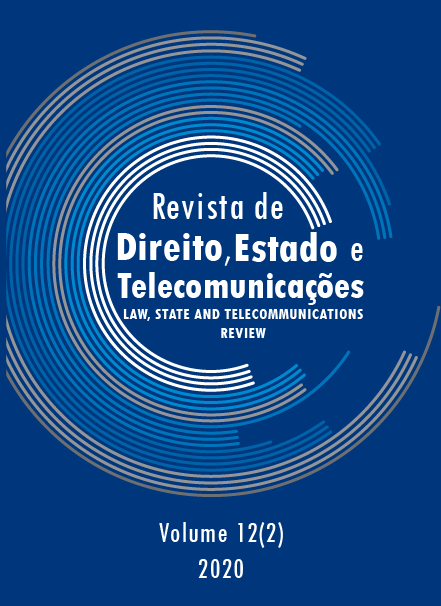PERSONAL DATA IN THE SOCIAL SECURITY INSTITUTE
EXPLORATORY ANALYSIS ON SOME PERSONAL DATA PROTECTION PRACTICES IN THE SOCIAL SECURITY SYSTEM OF THE PARAGUAYAN STATE
DOI:
https://doi.org/10.26512/lstr.v12i2.34689Keywords:
Privacy. Personal Data. Sensitive Data. Biometrics and Health Data. Social Security.Abstract
Purpose ”“ The research aims to observe and describe the legal framework and implementation practices of personal databases management in the Social Security Institute (IPS), the most important public social insurance system in Paraguay.
Methodology ”“ The research is exploratory, consisting on both substantive and procedural law analysis of health information storage regulations and its compliance. Also, interview to private companies, the public sector and one qualified worker insured by IPS are conducted to better understand collection, storage and maintenance of health records databases.
Findings ”“ Research indicates evidence that biometric data storage of insurers does not have adequate regulation for its protection. It also shows evidence that private companies don’t deliver by default medical records to workers, as well as potential access to these records by administrative personal. Evidence also signals that clinics performing medical examinations request more sensitive information than required by law. Research limitations It is identified that a broader private company sample could be of use to better understand workers health record collection. Also, third party auditing IPS IT systems could be of use to further understand information management practices and vulnerabilities.
Practical Implications ”“ A series of discretional practices are identified, signaling regulatory standardization urgency for all actors. A comprehensive Protection of Personal Data Act is needed.
Originality ”“ No comprehensive research targeting the IPS system and its health personal data management processes is identified. The research is considered an initial contribution to the state of the art on the subject and specially to biometric collection and storage.
Downloads
References
ABC COLOR. Fingerprints Are Taken to Collect Medications, September 3, 2016. Retrived from: <https://bit.ly/3bZyw8g>.
””””””. Tons of Irregularities, April 23, 2019. Retrived from: < https://bit.ly/2RpYJmS>.
ACUÑA, J; FULCHI, L. A; SEQUERA, M. La Protección de Datos Personales en Bases de Datos Públicas en Paraguay. Un Estudio Exploratorio. TEDIC, 2017. Retrived from: < https://bit.ly/2Zz2qeA>.
ASOCIACIÓN POR LOS DERECHOS CIVILES. The Identity We Can't Change. How Biometrics Undermine our Humanrights, 2017. Retrived from: <https://bit.ly/3hsSBoN>.
EUROPEAN UNION. Regulation (EU) 2016/679 of the European Parliament and of the Council, on the protection of natural persons with regard to the processing of personal data and on the free movement of such data, and repealing Directive 95/46/EC (General Data Protection Regulation). Retrived from: <https://bit.ly/2ZCsJAC>.
FARIA, P. L. de; CORDEIRO, J. V. Health Data Privacy and Confidentiality Rights: Crisis or Redemption? Revista Portuguesa de Saúde Pública, vol. 32, n.2, 2014, p. 123-33.
FERREYRA, E. ADC Biometrics and Protection of Personal Data. Buenos Aires: Asociación por los Derechos Civiles (ADC) Digital, 2017.
GAETE, R. Financiamiento de la Cobertura Universal de Salud en el Paraguay. Paraguay Debate, 2017. Retrived from: <https://bit.ly/3iwpeDh>.
INTERNATIONAL LABOR ORGANIZATION. About ILO. Retrived from: < https://bit.ly/3ml5sgn>.
______. Protection of Workers’ Personal Data. An ILO Code Of Practice. Geneva, International Labour Office, 1997. Retrived from: <https://bit.ly/2RtX9Au>.
______. C111 - Convenio sobre la Discriminación (Empleo y Ocupación), 1958. Retrived from: < https://bit.ly/2ZGd43o>.
______. C161 - Convenio sobre los Servicios de Salud en el Trabajo, 1985. Retrived from: <https://bit.ly/3kfjJcw>.
______. R171 - Recomendación sobre los Servicios de Salud en el Trabajo, 1985. Retrived from: <https://bit.ly/35Bk9pz>.
______. Hechos Concretos sobre la Seguridad Social, 2018. Retrived from: <https://bit.ly/3hEILQR>.
LUNA, J. R; SEQUERA, M. State Communications Surveillance and the Protection of Fundamental Rights in Paraguay. TEDIC and Electronic Frontier Foundation, 2016. Retrived from: <https://bit.ly/2DZfRNg>.
ORGANIZACIÓN MUNDIAL DE LA SALUD. Indicadores Básicos de Salud: Paraguay 2017. Retrived from: <https://bit.ly/3kfnDCc>.
PARAGUAY. Boletín Informativo. Noticias del Instituto de Previsión Social, Año 8/2018-Nº 104. Retrived from: <https://bit.ly/33r2TRm>.
______. Congreso Nacional. Ley no. 1682/2001, reglamenta la información de carácter privado. Retrived from: <https://bit.ly/2RozIJ3>.
______. Congreso Nacional. Ley no. 4933/2013, que autoriza la incorporación voluntaria de trabajadores independientes, empleadores, amas de ca y trabajadores domésticos al seguro social ”“ Fondo de Jubilaciones y Pensiones del Instituto de Previsión Social. Retrived from: <https://bit.ly/3khz4cz>.
______. Constituent Assembly, 1992. National Constitution of the Republic of Paraguay. Retrived from: < https://bit.ly/3hxRZOH >.
______. Instituto de Previsión Social. Misión, Visión y Objetivos Estratégicos. Primera Parte del Plan Estratégico Institucional (PEI) 2020-2024. Retrived from: <https://bit.ly/3kfoB1i>.
______. Instituto de Previsión Social. Aspectos generales del Seguro Social y del IPS, 2017. Retrived from: <https://bit.ly/3irSISG>.
______. Ministerio de Justicia y Trabajo. Resolución no. 730/2009, por la cual se releva la fe de erratas del Reglamento General Técnico de Seguridad, Higiene y Medicina en el Trabajo, aprobado por el Decreto no. 14390/92, en cual consta que el examen médico admissional, Test de Elisa, es obligatorio. Así mismo se reglamentan disposiciones referentes al Test de Elisa en el lugar de trabajo, observando las recomendaciones prácticas de la OIT y la Declaración de Compromiso UNGASS 2001. Retrived from: < https://bit.ly/2DZY8VZ>.
______. Plan Nacional de Ciberseguridad, 2016. Retrived from: <https://bit.ly/3ive9m0>.
______. Presidencia de la República. Decreto no. 7052/2017, por el cual se aprueba el Plan Nacional de Ciberseguridad y se integra la Comisión Nacional de Ciberseguridad. Retrived from: <https://bit.ly/3bZGCOc>.
PRIVACY INTERNACIONAL. Biometrics: Friend or Foe of Privacy? Briefing, 2017. Retrived from: <https://bit.ly/3bYNV8K>.
SERAFINI, V. Guidelines for the Construction of the Social Protection Policy. Paraguay Debate, 2017. Retrived from: <https://bit.ly/32xJU8t>.
UNITED NATIONS. UN Rights Chief Urges Protection for Individuals Revealing Human Rights Violations. UN News, 2013. Retrived from: <https://bit.ly/33wUprA>.
______. Declaración Universal de Derechos Humanos, 1948. Retrived from: <https://bit.ly/2ZBL2WL>.
______. Human Rights Council. Report of the Special Rapporteur on the Promotion and Protection of the Right to Freedom of Opinion and Expresión, Frank La Rue. A/HRC/23/40, 2013. Retrived from: <https://bit.ly/3c0CYnk>. ______.
Downloads
Published
How to Cite
Issue
Section
License
Copyright (c) 2020 Law, State and Telecommunications Review

This work is licensed under a Creative Commons Attribution 4.0 International License.
By submitting this paper to the Law, State and Telecommunications Review,
I hereby declare that I agree to the terms of the Creative Commons Attribution 4.0 International (CC BY 4.0).


